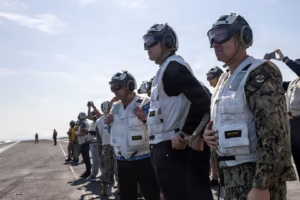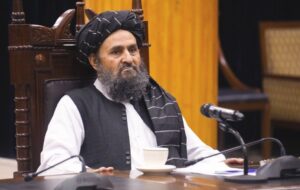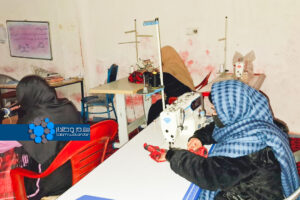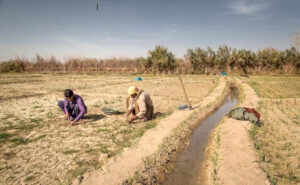KABUL (SW) – Salam Watandar has documented at least 44 instances of censorship imposed on its reporters by the Islamic Emirate authorities in 15 provinces of the country.
Salam Watandar documented these cases of censorship in interviews with 18 journalists from 15 provinces, including 25 before the broadcast, 7 during the broadcast, and 12 after the broadcast and publishing.
The findings also show that 11 cases of censorship have led to insults, humiliation, arrests and beatings of journalists.
A reporter in Nimroz province, who did not want to be named, said that he had been twice detained by local officials of the Islamic Emirate because of reporting on the situation of Afghan refugees on the Pakistan-Iran border and once because of reporting on Nimroz customs revenues.
A freelance journalist in Samangan province, also reported a case of obstruction of reporting. “In Samangan, we are not allowed to make reports that are against or against the wishes of the local authorities,” he said. “Once I wanted to report on the schools in the villages of Samangan, and the information and culture officials stopped me and warned me that after that, I would have to get permission for every report I made.”
Sayed Maroof Saeedi, a Salam Watandar reporter in Ghor province, complained about the censorship of news and reports in the province, citing three cases of censorship (two before the broadcast and one after the broadcast).
According to him, he has been censored twice by the officials of the Ghor Department of Information and Culture and once by the spokesman of the governor of the province. “Once, because of a report I made, the spokesman for the governor of Ghor told me that if I continued to make such reports, I would face reaction,” Saeedi added.
Zakaria Hassanzada, a reporter for Tamadon TV in Ghazni province, also reported repeated censorship by local officials. He described two cases of censorship in the preparation of his reports, one at the Kabul-Ghazni taxi stand and the other on the economic situation.
“On October 17, 2021, I reported a dispute between the drivers of the Kabul-Ghazni station. The forces of the Islamic Emirate arrested me, took me to the police station, and I was released on bail.”
Nasima Ronaq, a Salam Watandar correspondent in Balkh, said that in at least four cases, her reporting had been blocked by local officials. She added that these reports were about the situation of women. “When I see the authorities, they remind me that I have had critical reports about them”, she added.
Faqir Mohammad Faqirzai, a journalist in Nangarhar, also cited three cases of censorship he has faced. His reports were on the situation of women in Nangarhar, women’s activities in the province, and a women’s workshop that have been blocked by local officials.
“A few days ago, I was reporting on a girl tailoring cloths in Behsud district when I was stopped by security forces,” added Faqir.
The survey shows that almost every journalist in the provinces has been obstructed, warned, interrogated, threatened and detained by local officials at least twice since the rule of the Islamic Emirate in the country.
A reporter in Faryab reported two cases of censorship before broadcasting on condition of anonymity, saying he planned to report on the closure of a women’s office in the province, but was unable to do so due to threats and pressure from local officials.
He added that in another case, on March 15, 2022, he was preparing a report on the students at Faryab University, but was threatened by the officials of the university and he was not allowed to broadcast the report.
Two journalists in Logar, who declined to be named in the report, said that they faced censorship while reporting on internal clashes between the forces of the Islamic Emirate, on corruption in the provincial passport office, and a third time on the security situation. Local officials and intelligence forces of the Islamic Emirate forced them not to publish these reports.
Anwar Saadatyar, a Salam Watandar journalist in Bamyan province, was summoned and interrogated four times by the governor’s spokesman on February 24 and 26 for broadcasting his reports.
A report by Saadatyar on the Deputy Minister of Economy’s visit and one report on April 8 in connection with the detention of girls in Bamyan led to him being summoned by the Director of Information and Culture of Bamyan. He says that while the materials of these reports were removed, he was interrogated.
In addition to this, two journalists in Badghis and Ghor provinces who did not want to be named are among the journalists who have been beaten, insulted, obstructed and censored by local officials.
Badghis correspondent said that once he was beaten by the Islamic Emirate forces for covering an explosive incident, and his report about the internal conflict of the Islamic Emirate forces in the province was not broadcast following the pressure of the officials.
The Ghor correspondent said that his four reports on the schools, the graduation of female students and the situation of women have been blocked by officials.
Journalists from Jawzjan, Helmand and Zabul also reported four cases of censorship. One report on the activities of the so-called Islamic State or Daesh in Jawzjan, another on the situation of restaurants in Helmand, and a third on the deployment of Islamic Emirate forces from Zabul to Panjshir, which were prevented from being aired.
A reporter in Uruzgan documented three cases of censorship on reports about traffic accidents, water management and complaints from former government officials. He said that the officials of the security command and the provincial officials threatened him and prevented him from broadcasting his reports.
Gul Mohammad Gran, editor-in-chief, of Salam Watndar said in this regard that the Islamic Emirate authorities have shown serious reactions after the broadcast and even before the news and reports were broadcast through the media recently.
He narrated four such instances when he was summoned to the intelligence office of the Islamic Emirate on March 17 and 23, and on May 23 and 29. He added that he has faced pressure, obstruction, censorship and threats from the officials of the Islamic Emirate and has been held accountable for journalism.
According to him, thee provincial media reporters have repeatedly contacted him and complained about the restrictions and challenges faced by local officials. “The Department of Intelligence, Information and Culture and the officials of the Promoting the Good and the Prohibition of the Evil and other local officials are forcing our colleagues to censor their reports”,, he said.
He added that in Kabul, he was repeatedly summoned by the intelligence service and it was made clear to him that Salam Watandar should not have published such reports.
Journalists in the provinces, meanwhile, are concerned about the lack of opportunities to produce investigative reports or even regular reports more seriously and critically.
Two journalists in Herat, who did not want to be named, said they could not produce critical and investigative reports for fear of repercussions and were forced to self-censor.
According to the Salamat Watandar documentation, the Islamic Emirate officials are mostly reluctant to report on women’s rights, security situation, especially Daesh, internal strife, corruption, social challenges and the issues that question the functions of the Islamic Emirate.
On the other hand, media support institutions consider the interference of officials in the work of journalists as violation of the law on mass media and are concerned about the consequences.
“Any censorship and pressure on the media is against the mass media law, which is still in force,” Zarif Karimi, a leading member of the Federation of Journalists and Media Institutions of Afghanistan, told Salam Watandar.
However, senior Islamic Emirate officials say local officials are solely responsible for coordinating with the journalists. “Local officials have no right to interfere, journalists are free to work, they just have to coordinate with the authorities when they go to the field to facilitate their work,” said Bilal Karimi, a deputy spokesman for the Islamic Emirate.
Two journalists (Roman Karimi and Sayed Sarvar Hashemi) were recently detained by Islamic Emirate forces while reporting on women’s protests in Kabul.
It is worth mentioning that although the Islamic Emirate has announced about the resumption of activities of the Media Violations Commission several times, so far there is no news about the activities of this institution to investigate such complaints.
ENDS







